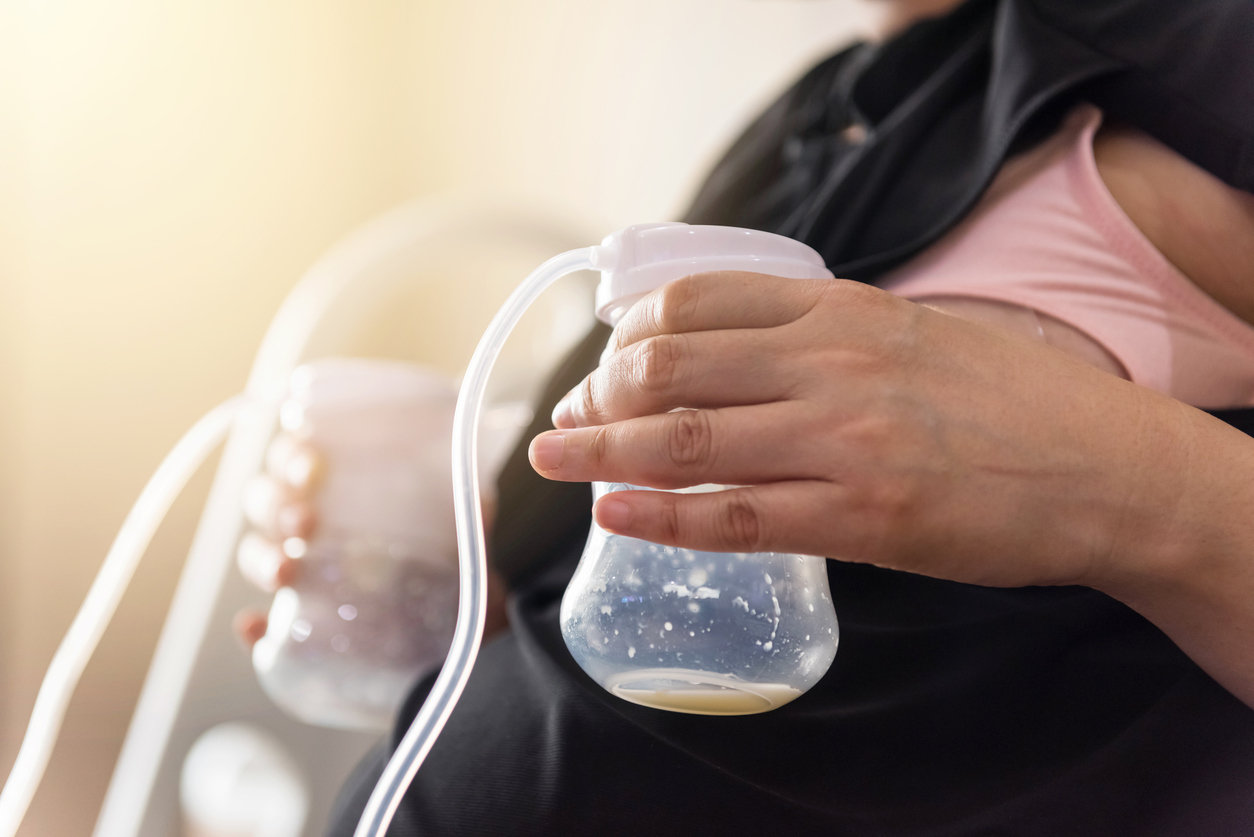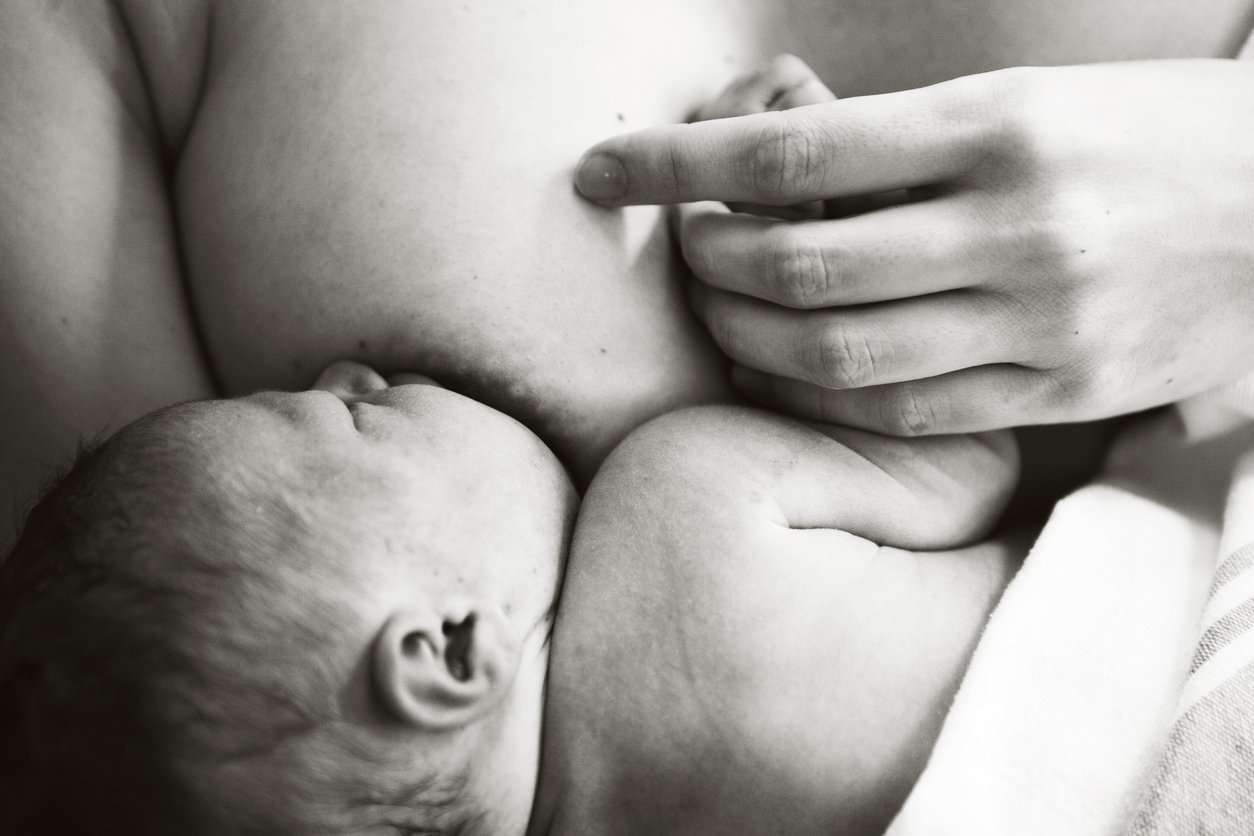
Once parenthood is on the horizon, a whole new world of information gets unleashed from just about everyone — expert or not. Although some of the details and facts shared are wanted, other things are unsolicited and can even be harmful, not only by adding a layer of stress, but with data and details that are just not factual. This is especially true when it comes to breastfeeding — and it's very hurtful when some of these myths give a mom shame when breastfeeding.
There are so many breastfeeding myths that are basically un-thruths that tend to get repeated, without all the particulars factored in. With that in mind, gathering up all those myths is important so new moms are armed with the best information out there. Myths need to be debunked.
The good news is, however, is that there is a ton of great information out there to be absorbed — along with so many great resources that moms can lean on within their own community, especially in new mom groups. Not all of the stuff thrown at new moms is bad — and even when it is, it isn't with malicious intent. Oftentimes, people just want to help. But sometimes that "help" isn't helping, especially when the details are scant and not exactly true.
In looking at some of the more common myths, a pattern emerges. And that's one of getting moms to trust their gut and their instincts. Another pattern is making sure moms know that they are powerful and incredible beings who just created life, and have the ability to sustain it, and help their baby thrive. A mother's breastfeeding journey may be filled with every emotion out there, and so that's why debunking these myths can help take a bit of worry away so the best emotions make the most lasting impression.
Myth: It's easy.

Some moms can breastfeed with ease, but that's not the case for all mamas. And that's to be expected. Breastfeeding isn't always easy, but if you want to nurse your baby, it's worth trying. Enlist help. Many local parenting groups often host La Leche League meetings that are there to help and connect you to other parents.
Myth: It's the most natural thing you can do.

Breastfeeding is natural, but there has to be caution when using that word. For some moms, it's just doesn't come naturally. Choose words that do not make anyone feel left out or less than. All moms deserve respect for doing the best they can with however they are feeding their babies.
Myth: You have to nurse every two hours.

Some babies nurse every two hours, but that doesn't mean that all babies will want to. According to KellyMom, it's important to look for hunger cues to know when it's time for baby to nurse again. The times may vary. It's important to not stress out over the clock and look to baby for signals it's time to eat.
Myth: You can never give your child a bottle.

"Nipple confusion" is a term that tends to scare moms. It shouldn't. La Leche League has some great tips to help babies who may be experiencing an issue with latching after taking a bottle. Some babies need to get their food from a bottle and straight from mama — it can be done.
Myth: You'll feel like your only purpose is making milk.

There may be times you feel that breastfeeding is a full-time job and in a way it is. But oh what a beautiful job it is. Remember that in parenting, whenever something seems to take you to the point when you think you can't take another moment, it changes. When you stick with anything, it tends to get easier.
Myth: You'll make enough milk every time.

Some mamas are super producers and seem to be able to make enough milk to feed all the babies. Others moms may not produce enough. Both kinds of moms are amazing and doing the best they can. It's important to remember that if you aren't producing enough milk at every feeding, chances are it will even out and baby will get what she needs when looking at daily intake. However, if her hunger cues are strong and you notice you aren't producing enough, talk to an expert to see if there is anything more you can do or need to do to make sure your little one is getting enough.
Myth: You'll need to pump to see how much milk you produce.

When you pump, you get to see how much milk you are producing. However, many times a pump won't yield the same amount of milk as when baby nurses directly. You don't need a pump to know your output. The answer to if you are producing enough is within your baby's elimination, her hunger cues, and how well she is thriving.
Myth: Breastfed babies don't sleep.

The experts at KellyMom remind parents that all babies are different. This is also true for breastfed babies and their ability or inability to sleep through the night. There is no one-size-fits-all answer to this — it really depends on baby.
Myth: Small breasts don't produce enough milk.

Breastmilk production has nothing to do with size. It's really that simple.
Myth: Your baby will become too dependent on you.

There may be a bit of concern that a baby nurses for comfort instead of hunger. And while it is important for babies to learn how to self-soothe, it's also great to comfort baby when she needs it. It won't become a dependency, but rather foster a bond. Besides, once kids get older, chances are that's when parents long for the days when baby was dependent.
Myth: You can't breastfeed twins.

Talk to any mama who nursed twins and they will tell you how it's very possible to breastfeed two babies at the same time. You'll just have the master the perfect hold. And still switch breasts as each baby will have their own kind of latch and pull.
Myth: You have to be careful about what you eat when breastfeeding.

There are certainly good things to eat when breastfeeding as well as things to avoid, but the key is to listen to your body. Your caloric intake will be a little higher since you are nursing — around 500 extra calories a day. And so you want to make sure you're healthy so you are making the healthiest food for baby.
Myth: You shouldn't breastfeed for more than a year.

The bottom line is this: You should breastfeed for as long as you can and want to. And of course, for as long as baby (or toddler or kid) wants to. The truth is that any amount of breastmilk your child gets for whatever duration of time you are nursing is beneficial. Do what is right for you.
Myth: You should wean when you go back to work.

There is no question that it can be challenging to pump at work, but with support (and a good place to pump and store milk), it can be done with ease. If you are devoted to continuing to breastfeed when going back to work, then you should.
Myth: A blocked duct means you should stop nursing.

It may be intuitive to stop breastfeeding if you have a clogged duct, however the opposite is true. Treating a plugged duct can be done best when the breast is empty, so nursing baby is a good idea. You'll also want to work with compression, massage, and warm compresses to further help.
Myth: Breastfeeding will ruin your breasts.

Mothers have superpowers. Not only can moms create life in their womb and birth babies, but they can make food. If there is anything more magical than that, please let us know. For that reason alone, a woman's body can never be ruined from doing any of these things.
Myth: Your partner will feel left out.

If you use bottles in breastfeeding, then great — have your partner feed that way. But if you are exclusively nursing and your significant other feels left in the cold, have them do skin-to-skin contact with baby after nursing, so they will achieve that beautiful bond, too.
Myth: It's an effective form of birth control.

This is a tricky myth and the reality is that it really depends on how you breastfeed. So this goes on the myth list because it isn't an effective form of birth control all the time, in every instance.
Myth: Pain is normal.

While some pain is normal, all of it is not. If you are experiencing prolonged pain or discomfort, you may need help with repositioning, latch, or have a clogged duct. It's important to not only read your baby's cues, but your body's as well.
Myth: You'll breastfeed if you're a "good mom."

If you end up being a champion breastfeeding with zero issues, then that's wonderful. But that doesn't make anyone the best mom ever. Some moms try nursing baby and it just doesn't work out for them. And that's okay. Just like every baby is different, so is every mother. What works for one, may not for another. What makes anyone a good mom is quite simple: love.




